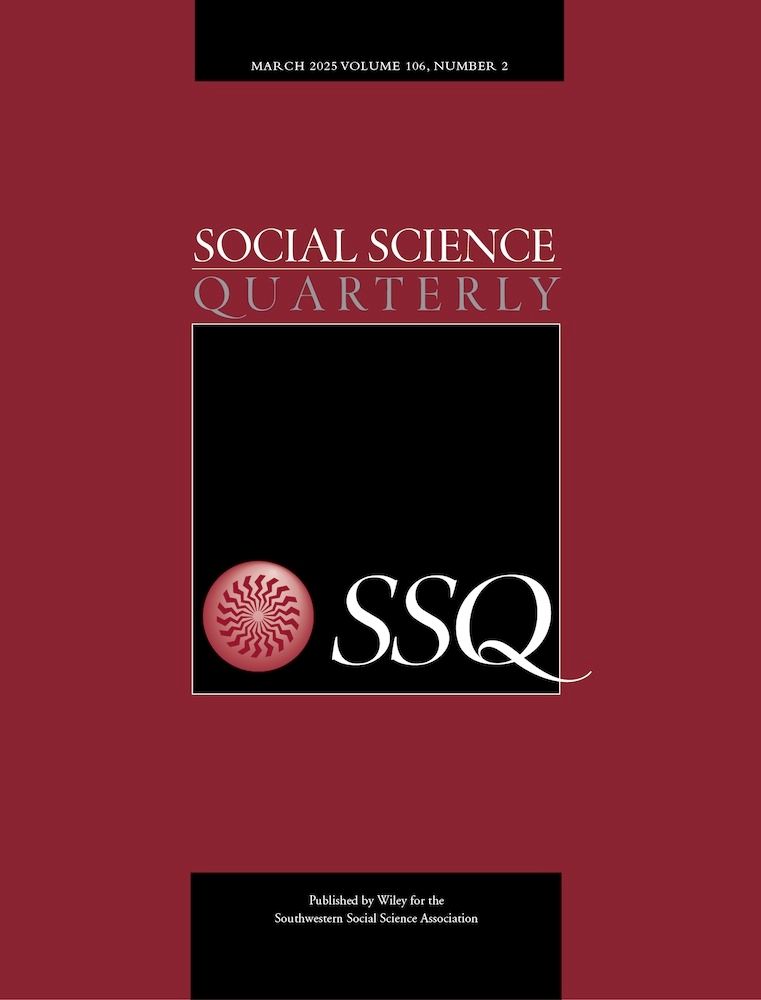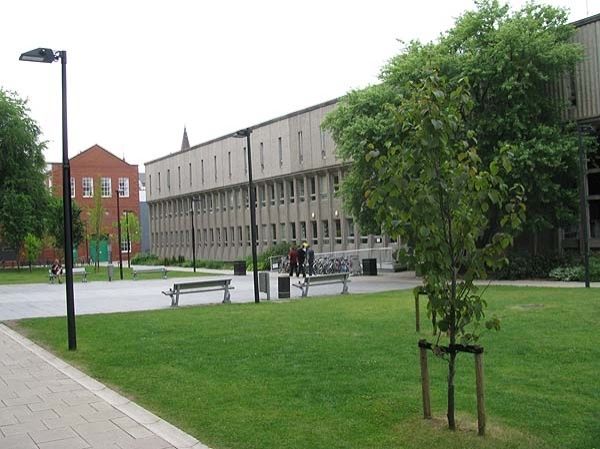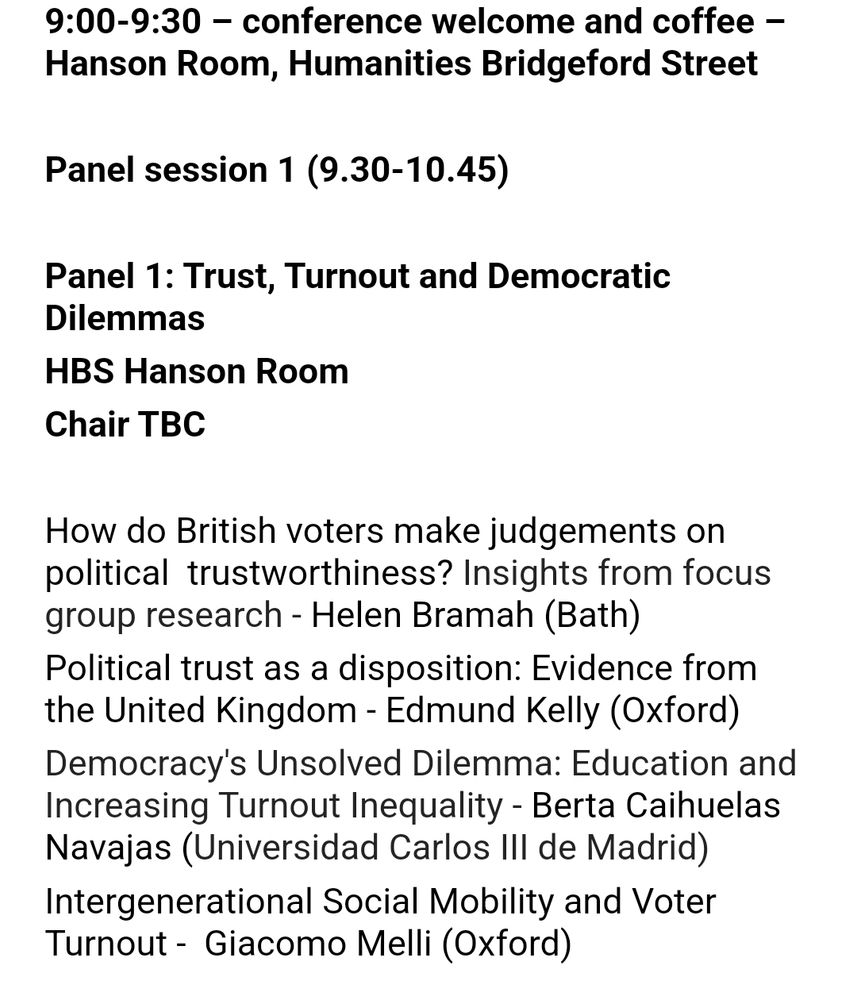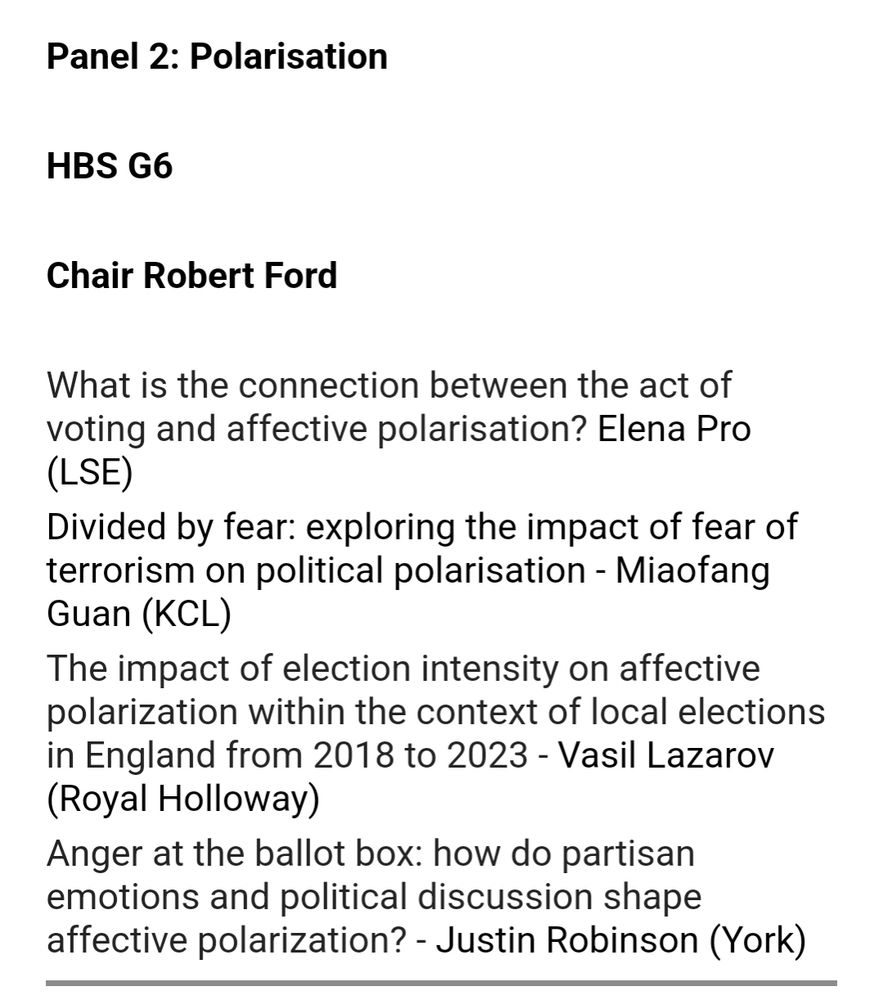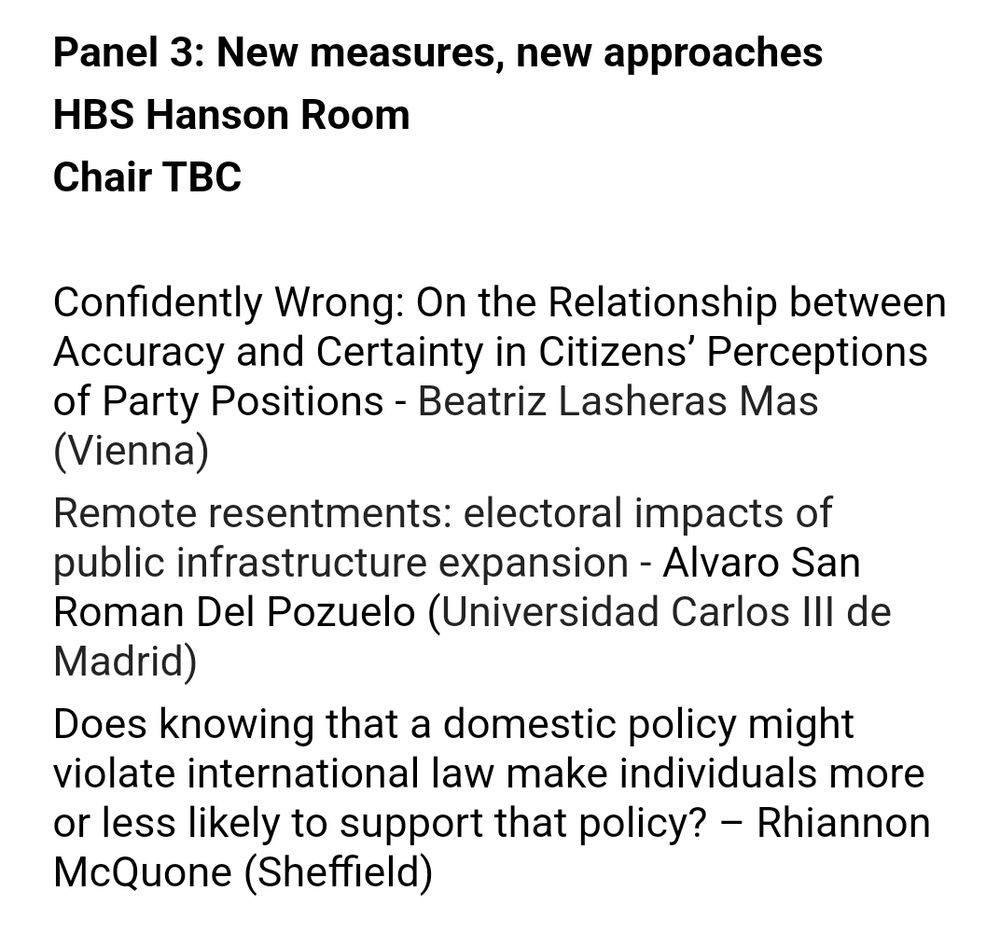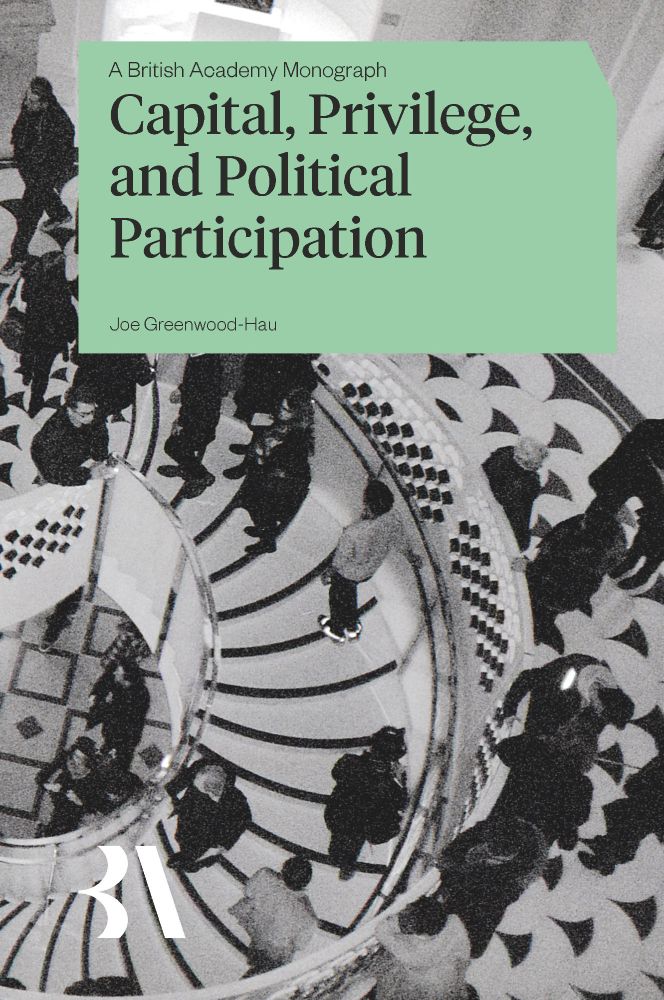
🚨New book alert!🚨
Thrilled to announce that my @britishacademy.bsky.social Monograph, 'Capital, Privilege, and Political Participation,' will be published via @livunipress.bsky.social later this month.
Find details and pre-order (with discount) here: liverpooluniversitypress.co.uk/doi/book/10....
08.08.2025 08:39 — 👍 40 🔁 15 💬 8 📌 3
It'd be great to connect when you're back in town!
05.06.2025 17:36 — 👍 3 🔁 0 💬 0 📌 0
Congratulations, great job! 🥳
11.04.2025 11:29 — 👍 1 🔁 0 💬 1 📌 0
@stefaniereher.bsky.social and my recent article on 'Public Opinion towards Interest Groups' now appears in print in the European Journal of Political Research
More on its contents in the 🧵 below
@ecpr.bsky.social @ecprinterestgroups.bsky.social
10.04.2025 12:23 — 👍 34 🔁 9 💬 1 📌 0
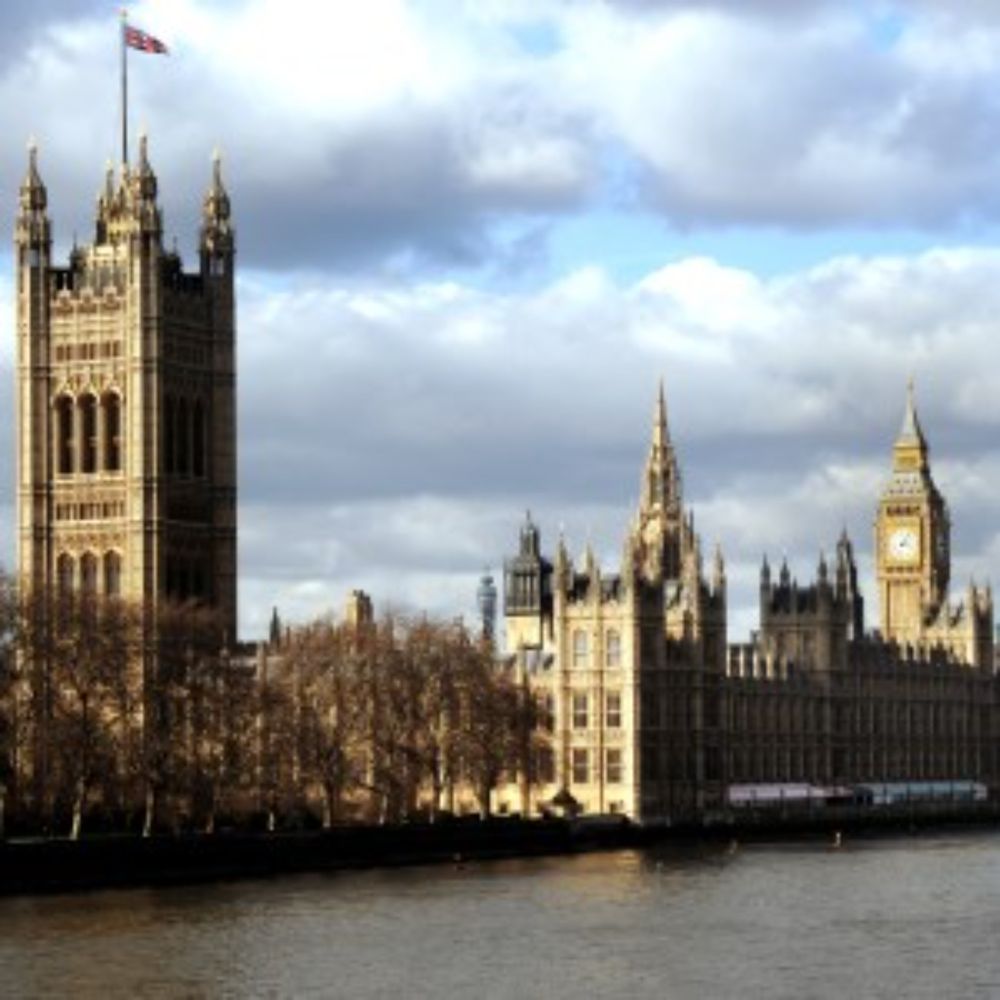
Parliamentlive.tv
Modernisation Committee
Highly recommend watching/listening to this oral evidence session on Access to the House of Commons. Powerful testimonies by MPs Marie Tidball, Sarah Bool, Marsha de Cordova, Steve Darling, and former MP Robert Halfon on their experiences of barriers in Parliament. parliamentlive.tv/event/index/...
04.04.2025 15:14 — 👍 3 🔁 0 💬 0 📌 0
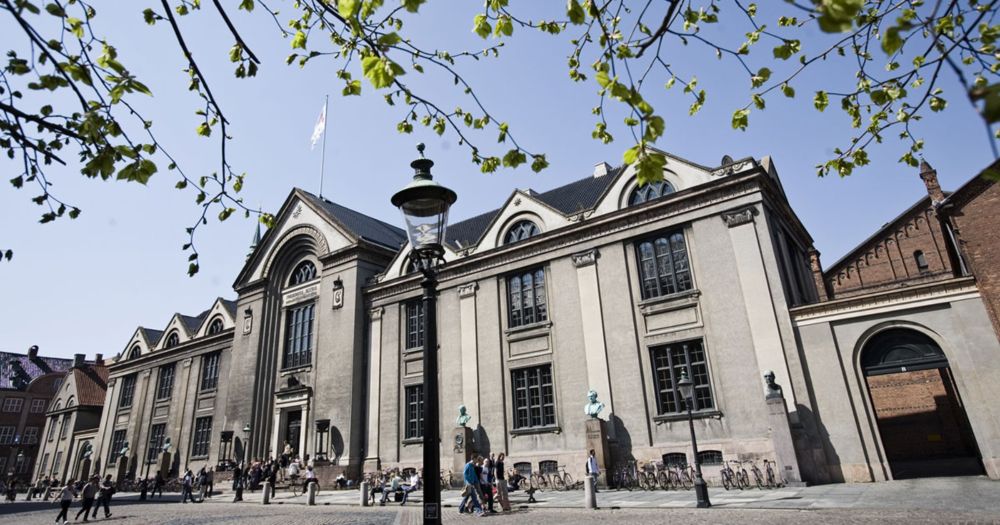
Postdoctoral Researcher Position (3 years) in Political Science as part of the ERC-funded Lobbying (A)symmetry Project
🥁The LOBBYMETRY project is hiring:
1 PostDoc & 1 fully-funded PhD 🥳
Come to beautiful Copenhagen to research lobbying, informational quality and public policy formulation!
PostDoc: jobportal.ku.dk/videnskabeli...
Please spread the word & and do not hesitate to reach out with questions!
31.03.2025 09:18 — 👍 29 🔁 22 💬 3 📌 6
Great to see Sally Friedman and Richard Scott's article on the campaign experiences of candidates with disabilities published: doi.org/10.1111/ssqu...
Familiar stories of inaccessibility, costs, and prejudice, but also of good conversations, changed minds, perseverance, and a shared mission.
10.03.2025 20:38 — 👍 2 🔁 0 💬 1 📌 0
@elizabethjevans.bsky.social and I had the opportunity to talk to @alanrenwick.bsky.social about our research and our book Disability and Political Representation on the UCL Uncovering Politics Podcast. Thanks for hosting us!
02.03.2025 11:43 — 👍 7 🔁 8 💬 0 📌 0
If voters know the candidate's party, there is no electoral penalty for disabled candidates.
However, they still get a small boost from left-wing voters who value their ability to represent underrepresented groups.
Please message me if you'd like the free access link to the article.
26.02.2025 11:45 — 👍 9 🔁 0 💬 0 📌 0
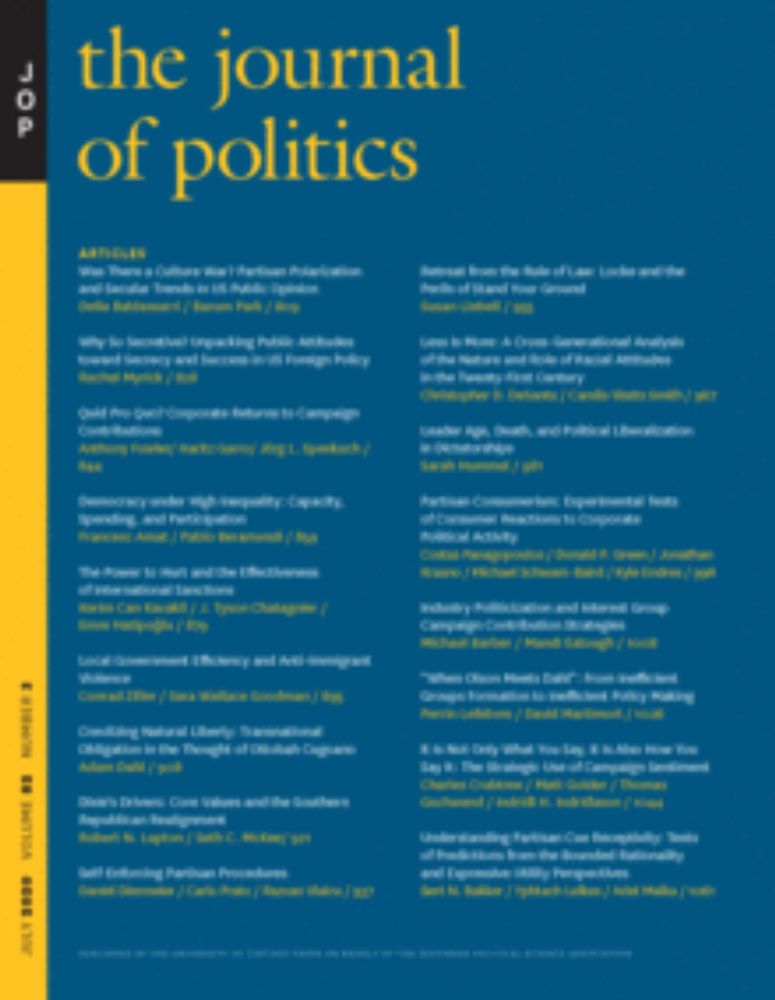
Voting for Disabled Candidates | The Journal of Politics
Despite important advances in the rights of disabled people, stigma and prejudice remain widespread. Meanwhile, disabled political representatives are few and far between. This raises the question: do...
My article on voter support for disabled candidates is now published at doi.org/10.1086/732994.
I find that left-wing voters in UK+US favour disabled candidates, while right-wing voters prefer non-disabled candidates - but only because voters assume disabled candidates to be more left-wing. [1/2]
26.02.2025 11:45 — 👍 67 🔁 23 💬 3 📌 0
Very interesting study, congrats! Do you have any insights on disabled voters?
28.01.2025 11:41 — 👍 1 🔁 0 💬 1 📌 0
Academic Advisory Group - Centenary Action
We’re thrilled to announce our new Academic Advisory Board, bringing together some of the brightest minds to provide insight, data, and rigorous thinking to enhance our campaigns. Excited to collaborate and learn from their expertise! 👩🎓
bit.ly/40Eik7n
22.01.2025 16:17 — 👍 5 🔁 4 💬 0 📌 4
How do disabled people take part in politics?: Easy read report: disability and political representation - ePrints Soton
Grateful to @sotonpolitics.bsky.social @unisouthampton.bsky.social for covering the costs of the production of a (free) easy read version of mine and @stefaniereher.bsky.social book Disability and Political Representation. @disrightsuk.bsky.social eprints.soton.ac.uk/494719/ #AccessibleAcademia
19.12.2024 11:07 — 👍 17 🔁 4 💬 0 📌 1
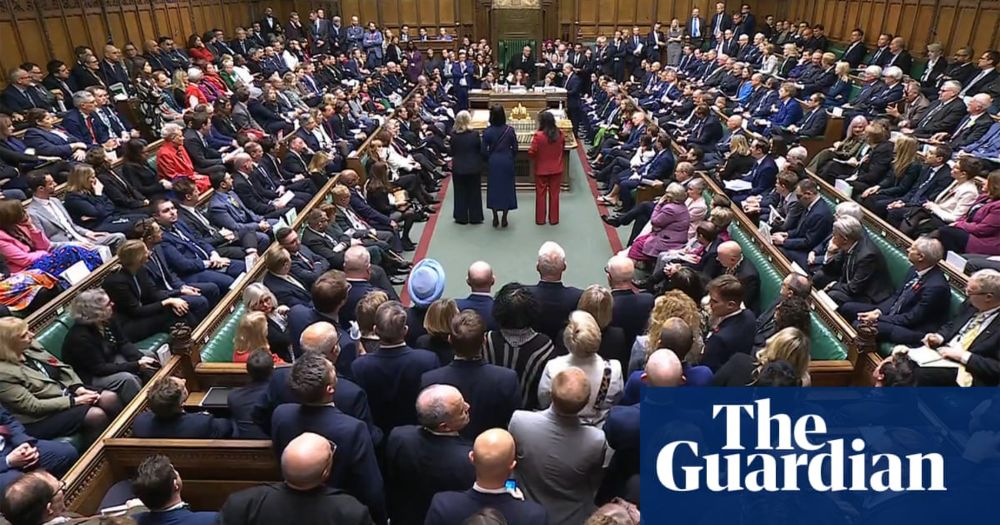
House of Commons should consider electronic voting, MPs say in letter
Exclusive: New MPs and backbenchers complain of wasted time in document sent to leader of Commons
Great to see MPs raising the issue of electronic voting www.theguardian.com/politics/202... it's one of the topics that @stefaniereher.bsky.social and I proposed in our submission to the Modernisation Committee. Accessibility should not be sacrificed on the altar of tradition.
18.12.2024 08:08 — 👍 19 🔁 6 💬 2 📌 3
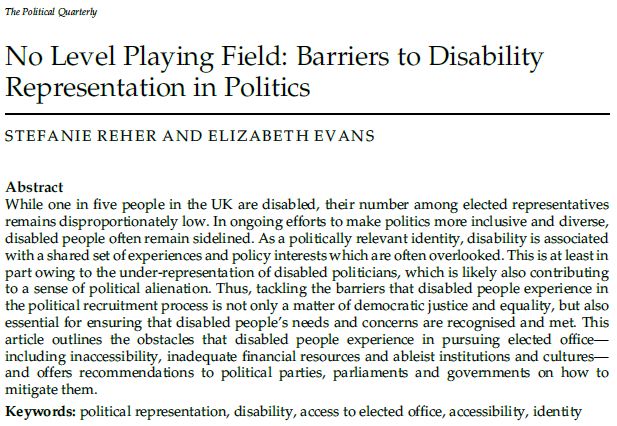
While one in five people in the UK are disabled, their number among elected representatives remains disproportionately low. In ongoing efforts to make politics more inclusive and diverse, disabled people often remain sidelined. As a politically relevant identity, disability is associated with a shared set of experiences and policy interests which are often overlooked. This is at least in part owing to the under-representation of disabled politicians, which is likely also contributing to a sense of political alienation. Thus, tackling the barriers that disabled people experience in the political recruitment process is not only a matter of democratic justice and equality, but also essential for ensuring that disabled people’s needs and concerns are recognised and met. This article outlines the obstacles that disabled people experience in pursuing elected office--including inaccessibility, inadequate financial resources and ableist institutions and cultures--and offers recommendations to
In our short @politicalquarterly.bsky.social article "No Level Playing Field" @elizabethjevans.bsky.social and I discuss the barriers to disability representation in politics:
Why are there so few disabled people in politics, why does it matter, and what needs to be done?
doi.org/10.1111/1467...
02.10.2024 11:36 — 👍 16 🔁 4 💬 1 📌 0
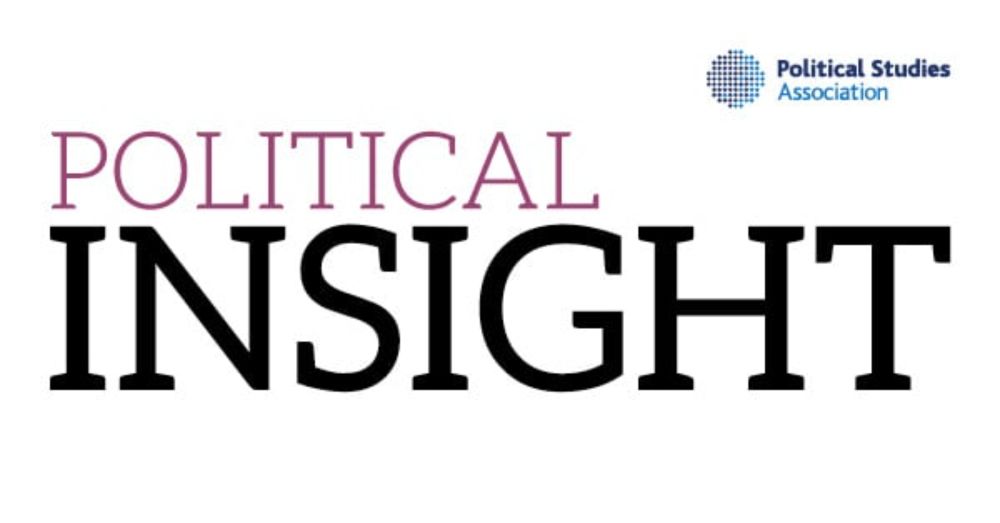
Disability and Representation in British Politics - Elizabeth Evans, Stefanie Reher, 2024
Here's me and @stefaniereher.bsky.social in Political Insight on disability & representation in British politics journals.sagepub.com/doi/full/10....
17.09.2024 08:58 — 👍 7 🔁 2 💬 0 📌 0
Do citizens use interest groups aligned with their political views as shortcuts to assess if their views are well represented, similar to political parties?
In new @ecpr.bsky.social Eur Jour Pol Research paper, @stefaniereher.bsky.social & I explore this ❓ using survey exp's in the US, UK, & D
🧵
10.09.2024 10:29 — 👍 12 🔁 7 💬 2 📌 2
We worked with the good folk at Go Easy Read to produce a freely available PDF version of our book Disability & Political Representation. Message me or @stefaniereher.bsky.social for a copy! #accessibleacademia
03.09.2024 09:47 — 👍 11 🔁 7 💬 0 📌 0
... publicly disclose mental health conditions in ongoing research with @robjohns75.bsky.social and Luca Bernardi. It appears that voters value politicians' openness and lived experience. Still, negative stigma of course remains, often fuelled by pundits and opponents questioning their abilities.
05.09.2024 11:04 — 👍 2 🔁 0 💬 1 📌 0
Voters Punish Politicians with Depression | British Journal of Political Science | Cambridge Core
Voters Punish Politicians with Depression - Volume 51 Issue 1
You're completely right, we need to study a wider variety of disabilities. Loewen & Rheault (doi.org/10.1017/S0007123419000127) show that voters are more hesitant to elect candidates with depression than with physical illnesses - although we found that UK voters react positively to MPs who...
05.09.2024 11:01 — 👍 0 🔁 0 💬 1 📌 0
🦾Non-disabled people feel better represented by non-disabled candidates - suggesting that disability is a relevant political identity to them as well.
🦾This means: we need more disabled politicians so that disabled people feel represented and not excluded from politics. (3/3)
28.08.2024 11:19 — 👍 4 🔁 0 💬 1 📌 0
🦾This feeling is strongest for those who identify with the disability community, but also exists among those who don't.
🦾The representative link cannot be fully explained by assumed shared preferences - disabled people value descriptive representation in and of itself. (2/3)
28.08.2024 11:19 — 👍 2 🔁 0 💬 1 📌 0
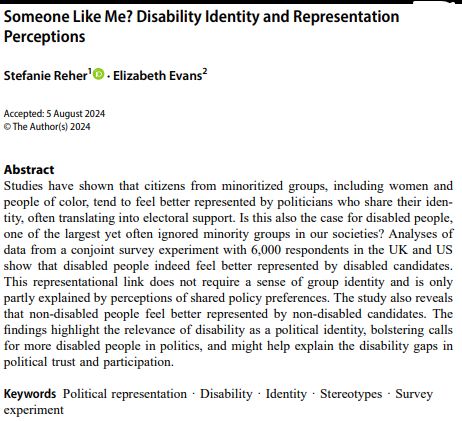
Abstract: Studies have shown that citizens from minoritized groups, including women and people of color, tend to feel better represented by politicians who share their identity, often translating into electoral support. Is this also the case for disabled people, one of the largest yet often ignored minority groups in our societies? Analyses of data from a conjoint survey experiment with 6,000 respondents in the UK and US show that disabled people indeed feel better represented by disabled candidates. This representational link does not require a sense of group identity and is only partly explained by perceptions of shared policy preferences. The study also reveals that non-disabled people feel better represented by non-disabled candidates. The findings highlight the relevance of disability as a political identity, bolstering calls for more disabled people in politics, and might help explain the disability gaps in political trust and participation.
@elizabethjevans.bsky.social and I have a new article out: "Someone Like Me? Disability Identity and Representation Perceptions". doi.org/10.1007/s111...
Through survey experiments in UK+US we found:
🦾Disabled citizens feel better represented by disabled than non-disabled candidates. (1/3)
28.08.2024 11:19 — 👍 45 🔁 22 💬 1 📌 0
Very pleased that the audiobook for Disability and Political Representation by me and @stefaniereher.bsky.social is out now (no they did not ask me to narrate it...) play.google.com/store/books/... a freely available easy read report version we've created with Go Easy Read will be out soon!
20.08.2024 13:01 — 👍 10 🔁 3 💬 0 📌 0
Committee and the study of disability within political science more generally. I hope that we can have a conversation rather than divisions amongst our community, and come together to support the Committee in their work.
17.04.2024 08:51 — 👍 1 🔁 0 💬 1 📌 0
Education policy, research and practice. Ex-University of Glasgow.
Research Fellow, University of Oxford
Theology, philosophy, ethics, politics, environmental humanities
Associate Director @LSRIOxford
Anglican Priest
https://www.theology.ox.ac.uk/people/revd-dr-timothy-howles
Professor at Aristotle University of Thessaloniki. Designer and Programmer of https://helpmevote.eu PI of https://datapopeu.gr and https://elnes.gr
Political Scientist @University of Zurich
https://www.simon-bornschier.eu
Political sociology at Freie Universität Berlin and WZB Berlin Social Science Center
PhD candidate @ippad_eu, @UvA_Amsterdam | Formerly MSc Psychology @Uniheidelberg | http://mastodon.world/@jakobkasper
A celebration of books and storytelling in the Scottish Stirlingshire village of Balfron.
5th to 7th September 2025
www.balfronbookfestival.com
Associate Professor of Politics, University of Lincoln. Parliament, the intelligence services, a little bit of social policy.
Associate Professor in Business and Public Policy at Roskilde University
https://thomaspaster.wordpress.com/
Professor of Political Science, University of Copenhagen. Research interests: European and Nordic Politics, Political Economy. Collector of modern ceramics, Faroese paintings and Christine Swane paintings. Lifelong fan of Bob Dylan and modernist poetry.
Doctoral Researcher in Political Science @dynamics.bsky.social & Research Associate @hertieschool.bsky.social | Sometimes working at Zeit Online | Interested in political geography, inequality and elections.
Professor of Political Science @uc3m social media, campaigns, disinformation, computational methods
Expert analysis of political data and global government developments from European Consortium for Political Research (ECPR). Listen to the latest election commentary on our podcast: http://bit.ly/3s4kgYj
European Political Science Review (EPSR) is an #OpenAccess journal of the European Consortium for Political Research (ECPR).
Publishing original and substantial contributions to the study of comparative European politics.
A journal from @ecpr.bsky.social and @cambup-polsci.cambridge.org
Lecturer at @johnsmithcentre.com, working with @uofgsocsci.bsky.social students on the annual UK Youth Poll. New book, 'Capital, Privilege, and Political Participation,' available now: https://liverpooluniversitypress.co.uk/doi/book/10.3828/9781836245902
The European Political Science Society: the not-for-profit professional association for political science in Europe and beyond
https://epssnet.org/
Research Associate at @iicfstrath.bsky.social
Research Interests: Sexual and Reproductive Health Rights, Youth, Migration, Autonomy
PhD Student in Politics at the University of Edinburgh. Researching the quality of political representation experienced by unpaid carers in Scotland 🏴
Completing research under ERC/UKRI funded project QUALREP.
Professor in political science at Uppsala University. Mainly work on gender & comparative politics (representation, recruitment, quotas, authoritarian politics, etc.).





